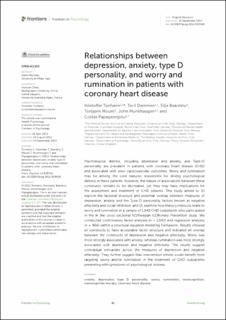| dc.contributor.author | Tunheim, Kristoffer Joe | |
| dc.contributor.author | Dammen, Toril | |
| dc.contributor.author | Bårdstu, Silje Kvam | |
| dc.contributor.author | Moum, Torbjørn Åge | |
| dc.contributor.author | Munkhaugen, John | |
| dc.contributor.author | Papageorgiou, Costas | |
| dc.date.accessioned | 2022-12-14T07:38:17Z | |
| dc.date.available | 2022-12-14T07:38:17Z | |
| dc.date.created | 2022-08-27T16:28:29Z | |
| dc.date.issued | 2022 | |
| dc.identifier.issn | 1664-1078 | |
| dc.identifier.uri | https://hdl.handle.net/11250/3037575 | |
| dc.description.abstract | Psychological distress, including depression and anxiety, and Type-D personality are prevalent in patients with coronary heart disease (CHD) and associated with poor cardiovascular outcomes. Worry and rumination may be among the core features responsible for driving psychological distress in these patients. However, the nature of associations between these constructs remains to be delineated, yet they may have implications for the assessment and treatment of CHD patients. This study aimed to (1) explore the factorial structure and po-tential overlap between measures of depression, anxiety and the Type-D personality factors known as nega-tive affectivity and social inhibition, and (2) examine how these constructs relate to worry and rumination in a sample of 1042 CHD outpatients who participated in the in the cross-sectional NORwegian CORonary Pre-vention study. We conducted confirmatory factor analyses (n=1042) and regression analyses (n=904) within a structural equation modelling framework. Results showed all constructs to have acceptable factor structure and indicated an overlap between the constructs of depression and negative affectivity. Worry was most strongly associated with anxiety, whereas rumination was most strongly associated with depression and neg-ative affectivity. The results suggest conceptual similarities across the measures of depression and negative affectivity. They further suggest that intervention efforts could benefit from targeting worry and/or rumina-tion in the treatment of CHD outpatients presenting with symptoms of psychological distress Keywords: Anxiety, Depression, Type D personality, worry, rumination, metacognition, Metacognitive Therapy, coronary heart disease Received: 26 Apr 2022; Accepted: 24 Aug 2022. | |
| dc.description.abstract | Relationships between depression, anxiety, type D personality, and worry and rumination in patients with coronary heart disease | |
| dc.language.iso | eng | |
| dc.title | Relationships between depression, anxiety, type D personality, and worry and rumination in patients with coronary heart disease | |
| dc.title.alternative | Relationships between depression, anxiety, type D personality, and worry and rumination in patients with coronary heart disease | |
| dc.type | Peer reviewed | |
| dc.type | Journal article | |
| dc.description.version | publishedVersion | |
| dc.source.volume | 13 | |
| dc.source.journal | Frontiers in Psychology | |
| dc.identifier.doi | 10.3389/fpsyg.2022.929410 | |
| dc.identifier.cristin | 2046452 | |
| cristin.ispublished | true | |
| cristin.fulltext | original | |
| cristin.qualitycode | 1 | |
